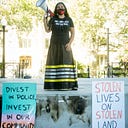Member-only story
Abolition for the People
Stolen Freedom: The Ongoing Incarceration of California’s Indigenous Peoples
For 350 years, California has imprisoned and disenfranchised its Native peoples like few other places
This article is part of Abolition for the People, a series brought to you by a partnership between Kaepernick Publishing and LEVEL, a Medium publication for and about the lives of Black and Brown men. The series, which comprises 30 essays and conversations over four weeks, points to the crucial conclusion that policing and prisons are not solutions for the issues and people the state deems social problems — and calls for a future that puts justice and the needs of the community first.
Abolition is more than an idea. Abolition is decolonization. Abolition on stolen land, as this is for Indigenous communities, is a radical dismantling of the carceral state.
For 25 years, Indigenous rights activists fought for an official UN Declaration on the Rights of Indigenous Peoples — for a document that doesn’t just affirm our individual human rights, but asserts our inherent and inalienable collective rights as Indigenous peoples. In 2007, that document was finally adopted by the General Assembly. Article 10 of the UN Declaration on the Rights…

